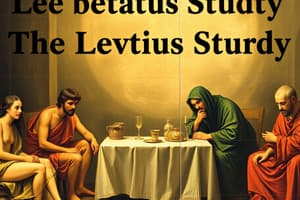Podcast
Questions and Answers
A person could sin by not doing what, when he heard a public charge about which he knew something? (Lev. 5:1)
A person could sin by not doing what, when he heard a public charge about which he knew something? (Lev. 5:1)
- Taking an oath
- Confessing his sins
- Offering a sin offering
- Speaking up (correct)
Touching any of the following was explicitly listed as making one unclean EXCEPT? (Lev. 5:2)
Touching any of the following was explicitly listed as making one unclean EXCEPT? (Lev. 5:2)
- Carcasses of unclean animals
- Unclean meat (correct)
- Unclean creatures that move on the ground
- Unclean livestock
- Human uncleanness
A person who was unaware of their uncleanness became guilty when? (Lev. 5:3)
A person who was unaware of their uncleanness became guilty when? (Lev. 5:3)
- He came before a priest
- He placed his hands on the head of the animal
- He became aware of it (correct)
- He came with the community to worship
What was considered a way to take an oath that left a person guilty? (Lev. 5:4)
What was considered a way to take an oath that left a person guilty? (Lev. 5:4)
When a person was found to be guilty before they offered the sin offering, they must? (Lev. 5:5)
When a person was found to be guilty before they offered the sin offering, they must? (Lev. 5:5)
One that was found guilty was to bring a ______ lamb or goat. (Lev. 5:6)
One that was found guilty was to bring a ______ lamb or goat. (Lev. 5:6)
If a person could not afford a lamb as a sin offering, they were allowed to bring a? (Lev. 5:7)
If a person could not afford a lamb as a sin offering, they were allowed to bring a? (Lev. 5:7)
If a person could not afford pigeons, they were to bring? (Lev. 5:11)
If a person could not afford pigeons, they were to bring? (Lev. 5:11)
The blood of a pigeon that was offered as a sin offering was put on the _______ of the altar. (Lev. 5:9)
The blood of a pigeon that was offered as a sin offering was put on the _______ of the altar. (Lev. 5:9)
What was the portion of the flour that was to be burned in the sin offering called? (Lev. 5:12)
What was the portion of the flour that was to be burned in the sin offering called? (Lev. 5:12)
In the sin offering, the priest made ________ for any of the unintentional sins. (Lev. 5:12)
In the sin offering, the priest made ________ for any of the unintentional sins. (Lev. 5:12)
If someone sinned against the LORD's holy things, they were to bring a ram as valued by what measure? (Lev. 5:15)
If someone sinned against the LORD's holy things, they were to bring a ram as valued by what measure? (Lev. 5:15)
The person that sinned against the LORD's holy things had not only to offer a sacrifice but also to offer restitution plus? (Lev. 5:16)
The person that sinned against the LORD's holy things had not only to offer a sacrifice but also to offer restitution plus? (Lev. 5:16)
Flashcards
Sin of Silence
Sin of Silence
Sinning by staying silent when you have knowledge of a public charge.
Sources of Uncleanness (Leviticus)
Sources of Uncleanness (Leviticus)
Touching certain unclean things such as a dead animal, or unclean human discharge.
When Does Uncleanness Cause Guilt?
When Does Uncleanness Cause Guilt?
Guilt arises upon realizing one's state of uncleanness.
Thoughtless Oath
Thoughtless Oath
Signup and view all the flashcards
Confession of Sin
Confession of Sin
Signup and view all the flashcards
Required Sin Offering
Required Sin Offering
Signup and view all the flashcards
Alternative Sin Offering
Alternative Sin Offering
Signup and view all the flashcards
Offering for the Very Poor
Offering for the Very Poor
Signup and view all the flashcards
Placement of Pigeon Blood
Placement of Pigeon Blood
Signup and view all the flashcards
Memorial Portion
Memorial Portion
Signup and view all the flashcards
Atonement
Atonement
Signup and view all the flashcards
Value of the Ram
Value of the Ram
Signup and view all the flashcards
Restitution Plus Fifth
Restitution Plus Fifth
Signup and view all the flashcards
Study Notes
Sin and Guilt Offerings
- A public charge known by an individual obligated them to speak up, failing which deemed them guilty (Lev. 5:1).
- Specific entities, like unclean carcasses and livestock, resulted in uncleanness; however, unclean meat was not among these (Lev. 5:2).
- Individuals unaware of their uncleanness were only guilty upon becoming aware of it (Lev. 5:3).
Oaths and Accountability
- Thoughtless oaths result in guilt, contrasting with other forms of oaths that do not carry the same weight (Lev. 5:4).
- Acknowledgment of sin must occur before offering a sin sacrifice; confession is a necessary action (Lev. 5:5).
Offerings and Sacrifices
- A female lamb or goat is required for those found guilty as a sin offering (Lev. 5:6).
- If unable to bring a lamb, two pigeons can serve as an acceptable alternative (Lev. 5:7).
- For those who cannot afford pigeons, fine flour without oil is acceptable as a sin offering (Lev. 5:11).
Rituals and Symbolism
- The blood of the offered pigeon is applied to the side of the altar, symbolizing atonement (Lev. 5:9).
- A memorial portion of the flour is burned during the sin offering, dedicated to the Lord (Lev. 5:12).
Atonement and Restitution
- The priest performs atonement for any unintentional sins committed (Lev. 5:12).
- Those sinning against the Lord's sacred items must offer a ram valued at silver of the sanctuary (Lev. 5:15).
- Additionally, restitution must include one-fifth of the value alongside the sacrifice (Lev. 5:16).
Studying That Suits You
Use AI to generate personalized quizzes and flashcards to suit your learning preferences.




